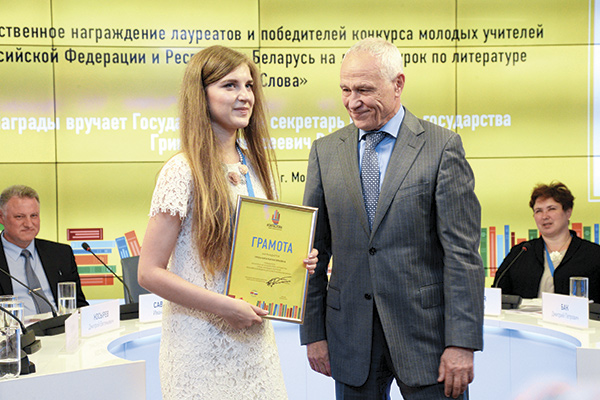
Natalia has won the Union State’s 3rd Word Power Competition, despite having only been working as a teacher for one year. Her lesson on works devoted to the rivalry between Vasil Bykov and Mikhail Sholokhov was recognised as the best by an international jury of eminent scientists, linguists and professors, who praised not only her knowledge of the subject but her creativity.
Ms. Gres admits, “Teachers now need to compete with other sources of information — such as news portals and video blogs. There’s no getting around it. I try to prepare lessons involving audio and video and involve children in planning a lesson. The teacher should be only a moderator, directed by the children.”
This year, teachers under the age of 28 were admitted to the ‘literary competition’, with over a hundred applications received by the Standing Committee of the Union State and MIA Russia Today. The best were invited to the Moscow finals, with each country represented by five teachers. They enjoyed not only awards and diplomas but also an extensive educational programme.
The State Literary Museum welcomed teachers with a lecture on the popularisation of Russian literature, the expansion of contacts, joint work by teachers from Belarus and across the Russian regions, and the museum’s mission as an enlightener and educator. The issue of what a modern literature lesson should look like was also studied and the answer was evident: it must be interactive, dynamic and youth-oriented.
The second day of the seminar began with a master class by teacher-methodologist Roman Doshchinsky, from Moscow’s Charles de Gaulle School. He focused on Yanka Kupala’s artistry. It might seem impossible to capture Russian children’s attention with works by a Belarusian poet. However, Roman succeeded. Moreover, his young colleagues actively joined in debate and discussion.
The State Secretary of the Union State, Grigory Rapota, tells us, “What is the scourge of society both in Belarus and Russia? We have many pupils who receive less than high grades. Because of them, we have many unqualified engineers, responsible for planes and buildings falling down, as well as bad law enforcement professionals and those in medical provision. Unfortunately, such people are also among men of letters. We want to see fewer low-performing students. Looking at you, young teachers, now, I believe this goal can be achieved. Only excellent students have gathered here: you can show how it’s necessary to serve the profession and other people.”
The topic of lack of student interest in reading aroused great debate. Even fashionable readers are less popular than we might hope. Roundtable participants agreed that a new approach is needed towards teaching literature. Knowledge is not the only priority; it’s important to generate interest in books, writers and characters. This is the key principle of teaching; only those who sincerely care for our native word can master it.
The Head of the Social Policy and Information Support Department of the Union State Standing Committee, Margarita Levchenko, is convinced that the Word Power competition enables teachers to demonstrate their strengths and enhances interest in their subject. “The future of any country relies on its younger generation. If teachers can inspire interest, if they are educated and enthusiastic, then their pupils will emulate them, becoming true citizens of the Union State. This is why work with school teachers is a priority for the Union State Standing Committee.
By Yuliana Leonovich











